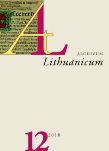Seniausios žinomos Lietuviškos glosos (1520-1530)
The Earliest Known Lithuanian Glosses (~1520-1530)
Author(s): Giedrius Subačius , Mariusz Leńczuk, Wiesław WydraSubject(s): Christian Theology and Religion, Theoretical Linguistics, Historical Linguistics, Baltic Languages
Published by: Lietuvių Kalbos Institutas
Keywords: Lithuanian glosses; 16th century; Lithuanian old texts; Lithuanian language;
Summary/Abstract: In 2006, one of the authors of this text, Mariusz Lenczuk, spotted the unknown glosses in the rare incunabulum at the National Museum of Poland in Krakow, in the collection of Emeryk Hutten-Czapski (Muzeum Narodowe w Krakowie, Muzeum im. Emeryka Hutten-Czapskiego): Joannes Herolt, Liber Discipuli de Eruditione Christifidelium (Student's Book Concerning the Instruction of the Christian Faithful), Basel, not before 1485, 2°; call number: MNK XV 44.2 Later the other two authors — Wiesiaw Wydra and Giedrius Subačius—identified the language of the glosses (further—HGl) as Lithuanian. Very little is known about the author himself. "Johannes Herolt called Discipulus, a Dominican Friar of Basel who flourished during the first half of the fifteenth century." Since Herolt's pseudonym was Discipulus, the beginning of the title Liber Discipuli may mean that the book De Eruditione Christifidelium was written by the author Discipulus.
Journal: Archivum Lithuanicum
- Issue Year: 2010
- Issue No: 12
- Page Range: 31-70
- Page Count: 40
- Language: English

